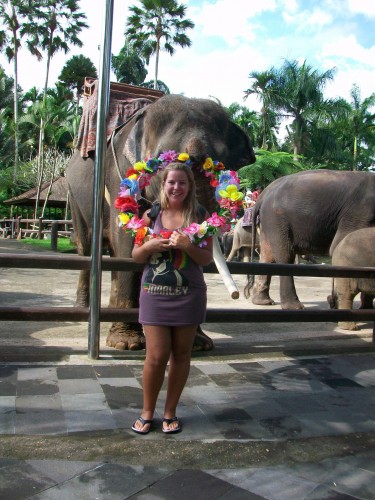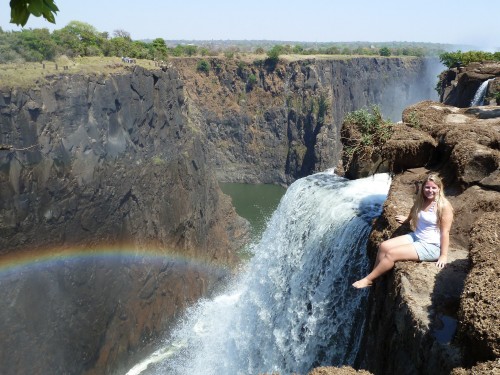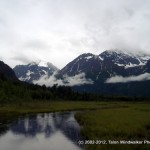Our next interview is with Toni White. You can learn more about her and follow her adventures by visiting her blog Reclaiming My Future.
What was your experience with depression before you began travel?
I was 13 years old when my life changed. One day I seemed to wake up and my mind had gone. To this day I don’t know the trigger of my depression. My mental illness began with psychotic depression, with me hitting the self-destruct button for 3 years pushing everyone away, but I was 16 before being officially diagnosed (a diagnosis I never shared with my family…to this day my mum still thinks the ‘rebellion’ was me being a ‘typical teenager’). I don’t remember much of those first years though there was a night I’ll never forget. I was 14 and I had been pacing in my room for 5 hours getting increasingly jittery and at 4 AM I finally collapsed on my floor in tears convinced that, not only was I a schizophrenic but that I was in hospital receiving treatment, I was just too ill to realise. That night scared me beyond words.
I then sunk into a deep depression and self-harm (cutting) became my friend, my medication and my counsellor for the next 3-4 years. I went nowhere without my knife, even (accidentally) to the airport when I was 19 (which was an interesting conversation with security) because it was the only thing that helped.
Slowly, as I grew up and another year with depression passed, I began to learn more about the illness and how it effected me in daily living. I learnt my triggers and ways to avoid them as much as possible. I realised how to lie well enough to hide my depression and I learnt that it makes me extremely empathetic and compassionate towards other people that are struggling (something I wouldn’t trade in a million years).
And you know what happened when I began travelling? I finally appreciated the ultimate lesson of depression and became thankful that all the attempts I’d made on my life over the years had failed. I realised that without experiencing such dark times throughout my life, I could never truly appreciate the europhically happy moments I experience on the road and those moments, however brief, can never be forgotten.
How has living with depression impacted your life?
I literally don’t know where to begin in trying to answer this. I could tell you that it spent a few years totally f*cking up my life because I was too young to truly appreciate what depression was (and therefore not only have a graveyard full of skeletons but an ocean of regrets), how it specifically acted in my life or what I could do to help control it a little better. Or I could tell you that actually, whilst I wouldn’t wish it on my worst enemy, sometimes (and that’s a very small sometimes) I’m grateful for it because of the unique life perspective its given me. Don’t get me wrong, when I’m too depressed to talk, let alone eat, I want nothing more than to be rid of this disease but for all the years I have suffered, I have also learnt some incredible life lessons (albeit the extremely hard way). I don’t take shit from anything or anyone, I know what it means to have a true friend and to be one and even if I am, metaphorically, sitting on the edge of a cliff contemplating jumping, if you need me, I’m there because I know how it feels.
What types of medications or medication alternatives have you used to try to treat it?
I have tried so many over the last 8 years that I can’t remember the names not to mention increasing the dosages of each one. It’s a lengthy process trying a new one…to get a real measure of whether it works for you or not you need to take it for weeks or months at a time and it seemed that many, after giving me an initial release of my depression, stopped working; I’ve yet to find one that works for me over the long run. It’s a tiresome journey and one, I fear, that may last a lifetime.
Was it hard to consider travel during depressive episodes?
The first time I travelled in the sense of backpacking was in March 2010 and I can’t deny that I wasn’t apprehensive about how my depression would affect me. I worried travelling solo could mean feeling alone and unhappy and that nights in hostels would mean I would lose out on sleep (one of the biggest factors in lowering my mood). Unfortunately, six weeks before I left for my trip, not realising I was pregnant, I suffered a miscarriage. I told myself to ‘stick my feelings in a box’ and ‘get on with it’ because I didn’t have time to deal with my grief so I ignored what had happened. It wasn’t until I began travelling, away from familiar people and places that I allowed myself to feel the grief. I had some amazing times in those 3 months around Asia but for the majority of the time I was either ‘numb’ or very depressed. Sometimes I would go days without talking to anyone but shop workers when I picked up water etc and occasionally I’d book a private room just so I could cry myself to sleep. But I took so many lessons about myself and depression home with me after going through it. Travel allows you to quietly unpack your baggage and gives you time to put it back in neatly and it was exactly what I needed to do. Some days were a lot harder than others but I kept going no matter what and experienced some truly life-affirming times in those three months.
Your blog’s name has some special significance. Please share that story with us.
When I started my blog in 2009, it was just as a diary for my pending travels so my friends and family could keep up. I’d just left a 4.5 year relationship after accepting I was no longer in love with him and moved back home; I was newly single and ready to begin a new life hoping that I would find my happiness on my way. I wanted a name that reflected both my present and future journey so chose ‘reclaiming my future’ because I had lost so much of my past to depression that I wanted to take back control of my life and make my dreams come true.
What have you noticed about how depression has affected you during your travels?
Travelling with depression, for me, means that often the ‘annoyances’ of backpacking such as transport delays have so much more significance to them. When things don’t go smoothly or I perhaps have a bad encounter with someone, it can bring me down so suddenly and being a solo traveller doesn’t necessarily help that as I have no one to share the burdens with, it’s a bittersweet Catch-22.
Tiredness, however, is my biggest trigger to a bad day when I’m travelling. If I haven’t slept well or had enough rest, anything that goes wrong seems magnified so I make sure that I find a private room or hotel room every now and then to completely recharge for a night or two so that I can ‘face the world’ again feeling a little more human and ready to take all the challenges on.
If you have long time periods when you don’t travel, do you tend to experience a relapse?
I won’t lie; it doesn’t help. Everyone experiences down times for weeks or months after they return from a big trip, especially if they don’t know when they’re travelling again, and I’m no different it’s just that, already having depression, that ‘home low’ can sometimes get very dark and I wonder how I can keep going if I haven’t booked another adventure. I may not necessarily relapse but it’s a constant worry.
Does living with depression change how frequently you travel?
If anything, travelling with depression makes me want to travel MORE frequently. If there’s one thing I’ve learnt over the years of living with depression is that leaving home, not staying in it, makes me happy. Whilst it may be incredibly hard for me to get on the plane because of how depressed or worried I am, I know that within days I will begin to find my serenity again. If I become depressed on the road, I just stop for a few days and have some down time by myself. I find a private room, get myself dinner and just do what I want, when I want until I feel stronger to keep moving so no, depression doesn’t stop me travelling, it just slows me down occasionally when it hits.
Have you found any non-travel-related activities that have a similar impact for you?
Truthfully? Nothing comes close to it and I struggle because of it. However, I have found that writing, whilst it doesn’t make me overtly happy, incredibly cathartic (whatever mood I’m in) and it does help to ease my depression if I can find the energy to write. Getting caught up in a good book, when I can stay focused, is a pretty good way to ‘lose yourself’ for a while too. Essentially, the thing that helps me the most is ‘words’, in any format.
What advice do you have for other people who are dealing with depression?
Do whatever you need to do and try everything! By that I mean, try medication and if that doesn’t work, try counselling or yoga, or a healer – keep going through the checklist because however tiring or frustrating it is, you WILL find one that works for you either completely or at least eases your pain.
And when I say ‘do whatever you need to’, I mean that once you find what works for you even in the smallest of ways such as watching a movie or reading a page of your book each night; do it! If you need to spend time alone instead of at a family gathering, do it! I skipped out on my normal Christmas gathering last month because I couldn’t cope with so many people etc and although they were upset I wasn’t going, they understood. When it comes to getting yourself better, you need (in the politest of ways of course) to be selfish because only you understand your needs and what helps you! If you have your family and a good set of friends around you, they will understand and will want you to get better.
Any thing else you’d like to add?
I suppose I would like to say, to people that don’t suffer depression but know of people that do; we can’t just pull ourselves together and smile because you ask us to. That’s like asking someone who has cancer to simply get better because you’re ‘fed up of seeing them so ill’. Depression is an illness; a terribly destructive, manipulative and selfish illness.
We’re not asking for sympathy when we say that ‘nothing is going right’; we’re asking for empathy and compassion that, in our minds, really, NOTHING is going right however you try and spin it for us. Even when positive things happen to us, we find the negative side to them but it’s not us talking, it’s the depression. When depression takes hold; thing of us as mimes…our mouths may do the talking but it is the illness speaking the words so please don’t hold it against us if you don’t like the answers!
Speaking of answers; don’t try and put logic to them because it won’t make sense and it won’t make us feel any better. Just because I KNOW that paying off my loan will make me feel better, it doesn’t mean I can find the energy to do anything about it; I’m not lazy, I’m ill. Having depression, when it comes to getting better, is like being in a bubble. On the outside of the bubble you can see the answers to your problems but you just can’t burst the bubble to get (or act upon) those answers which is a cruel torture in of itself. Knowing what I need to do and being able to do and believe in them are very different things.








February 1, 2013
Wow Toni, I never knew!!!
January 30, 2013
I booked a 3-wk trip to South Africa (first visit) as I was sinking into my latest cloud of depression this summer, and I hit a whole new depth 2 weeks later. I was nervous how I’d be on a group overland tour (picked to force myself into a routine – eating, sleeping, doing) when I was still undermedicated, but once I was there…I was in my element, and there was a sense of peace and rightness even though South Africa itself is such a strange land. It has me re-evaluating how I’m living so I can have more stretches of feeling normal.
January 29, 2013
Great post-I remember a family member telling me to put on some make-up to make me feel better; it was then I relalised how misunderstood I was. Thanks for sharing.x
January 29, 2013
Put on some make-up? *shakes my head*
January 29, 2013
What a brave post Toni, thank you so much for sharing this all. A lot of what you said has resonated with me, although not as all-encompassing, I have gone through a form of PTSD and your description of your feelings have really hit home.
January 28, 2013
What has helped me so much is a Chi Machine, not one of the knockoff’s. It gets my body and my mind going, been using it since 1999, just wanted to share:)
January 28, 2013
Wow, does this resonate with me. My deep depression also started for me around the age of 13. It was something, I think, that to this day is not understood by my family (who still bring up what a ‘problem teen’ I was without bringing up any of the illness I was suffering… I’ve been told that they hope my own child won’t cause me so much ‘grief’… Oy!). This past year I finally was able to put a clinical name to my depression (PMSD). Wow, it made all the difference in the world knowing that I wasn’t alone. Bravo to Toni for telling her story!
January 28, 2013
I hope it’s helpful to people to get to know others and to put a face on it.